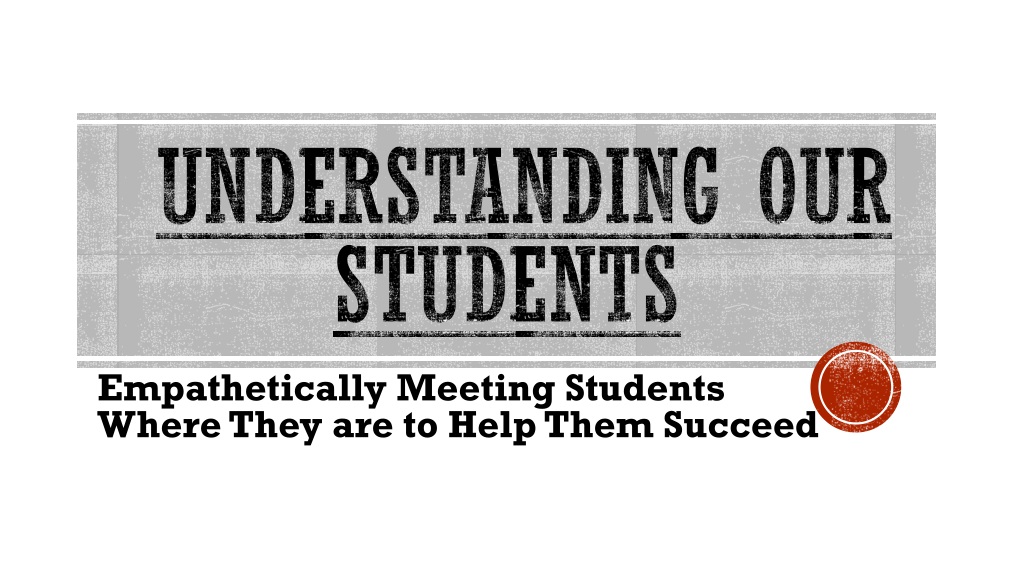

0 likes | 10 Views
Empathetically meeting high school students where they are academically and emotionally, especially in terms of writing and mental health struggles, is crucial for their success in college. Understanding their background in standards-based grading, limited exposure to longer writing assignments, and anxiety-related procrastination, educators can implement scaffolding and jigsawing techniques to help students navigate complex writing tasks effectively.

E N D
Empathetically Meeting Students Where They are to Help Them Succeed
My name is Will Carter. I have a M.F.A. in Playwriting and a M.A. in Teaching with a focus on English at the secondary level. I have been with KSU since 2018. I did 1 year as a part-timer, two years as a limited termer, and I am a Lecturer with the English department, going into my 4thyear this Fall. Previous to this, I was a high-school teacher for 2 and 1/2 years.
High School Students are: Used to being able to re-assess every assessment Used to being able to turn in all their work at the end of the semester Used to reading only shorter texts Familiar with writing only short writing assignments or not writing at all Entering college with mental health struggles
“According to a survey conducted by The Chronicle of Higher Education (2006), 61% of high school teachers said their students have never written a paper that was more than five pages” (Carnegie Mellon University, 2024). “63% of 12th-graders were not proficient in reading in 2019. 30% of 12th- graders didn’t meet NAEP’s basic level” (Benson-Harrington, 2024). Many of my students tell me that they do not read many books anymore. They largely read articles and shorter texts. One of the students are tutor in English told me that they read only one book his sophomore year, and he is a student at Alpharetta High School. In 2023, over three quarters of college students (76%) reported experiencing moderate to severe psychological distress. (Pena, et. al., 2022).
They are used to being able to re-assess. Many come from a standards based grading structure. They are used to re-assessing major assignments, so they often do not think about doing the planning and drafting that is required to have a successful essay, presentation, project, or exam. They also are unfamiliar with larger writing assignments, so they tend to stress out, and the anxiety leads to procrastination.
With deadlines With completing larger / more complex writing assignments With studying With drafting
Scaffolding and Jigsawing are two techniques that can help. Scaffolding is when you break up an assignment into smaller parts. Jigsawing is when you break up a task or a reading to completed by different students / groups of students.
Scaffolding: Paper final draft can be scaffolded to: 1. Thesis & Peer Review 2. Rough Draft & Peer Review 3. Final Draft
It can also look like this: Annotated Bibliography Final Draft 1. Mini-Bibliography in Class with a Group 2. First five annotations + peer-review 3. Next five annotations + peer-review 4. Last five annotations + peer-review 5. Rough Draft + peer-review 6. Final Draft
It can also look like this: Research Proposal Final Draft 1. Mini-Proposal in Class with a Group 2. Literature Review Draft+ peer-review 3. Research Proposal Rough Draft + peer-review 4. Second Research Proposal Rough Draft+ peer- review 5. Final Draft
It can look like this: Take a larger text and each group works with one section of the text. Take a larger assignment and each group of students takes one part of the assignment. It is important to have students share out / disseminate their work to each other, so there is a complete understanding at the end.
Can I get someone to volunteer to write answers others call out on the board?
What are some major assignments in your classes?
We will divide into groups, and each group will take one of the major assignments and discuss how you might scaffold it. You will have five minutes. Try to break it into at least three steps. You can certainly do more.
Break things down into smaller chunks. Utilize class time as a way for students to complete formative versions of the larger assignments. Understand that some of your students might be doing poorly but are trying very hard. Be flexible with deadlines. Offer extra-credit or other ways to counter-act an initial bad grade.
Benson Harrington, D. (2024, February 12). Moving ahead while left behind - the plight of students without reading proficiency. Moving Ahead While Left Behind — The Plight of Older Students Without Reading Proficiency. https://www.smartbrief.com/original/older-students illiterate#:~:text=37%25%20couldn’t%20read%20even,proficient%20in%20reading %20in%202019. Carnegie Mellon University. (2024). Why are students poorly prepared to write - Eberly Carnegie Mellon University. Why are students poorly prepared to write - https://www.cmu.edu/teaching/designteach/teach/instructionalstrategies/writing/p oorlyprepared.html Heubeck, E. (2024, March 12). High school students think they are ready for college. but they aren’t. Education Week. https://www.edweek.org/teaching-learning/high-school-students-think- they- are-ready-for-college-but-they-arent/2024/02 Peña, C., Ruedas-Gracia, N., Cohen, J. R., Tran, N., & Stratton, M. B. (2022, October 6). Ten simple rules for successfully supporting first-generation/low-income (FLI) students in STEM. PLoS computational biology. https://ncbi.nlm.nih.gov/pmc/articles/PMC9536642/ Robinson, R. (2021). Communication instruction in the generation Z classroom: Educational explorations. Lexington Books, an imprint of The Rowman & Littlefield Publishing Inc. Summers, J. (2022, January 18). A new look at how turmoil is defining the lives and politics of generation Z. NPR. https://www.npr.org/2022/01/18/1073335334/a-new-look-at-how- turmoil- is-defining-the-lives-and-politics-of-generation-z older Center - Eberly Center. Group,